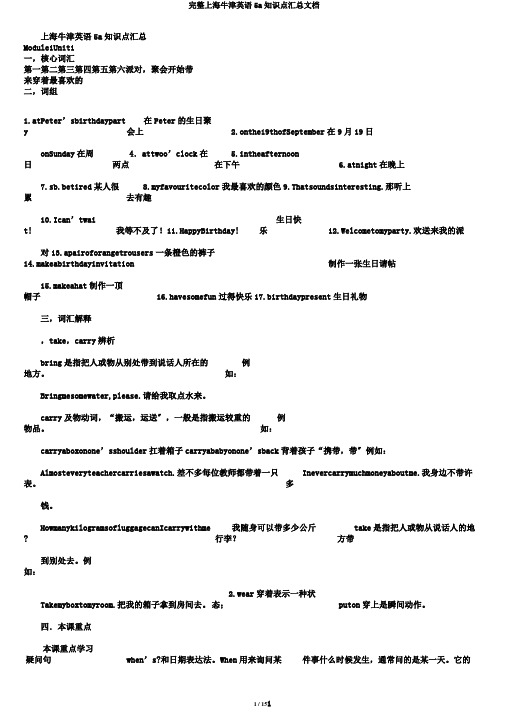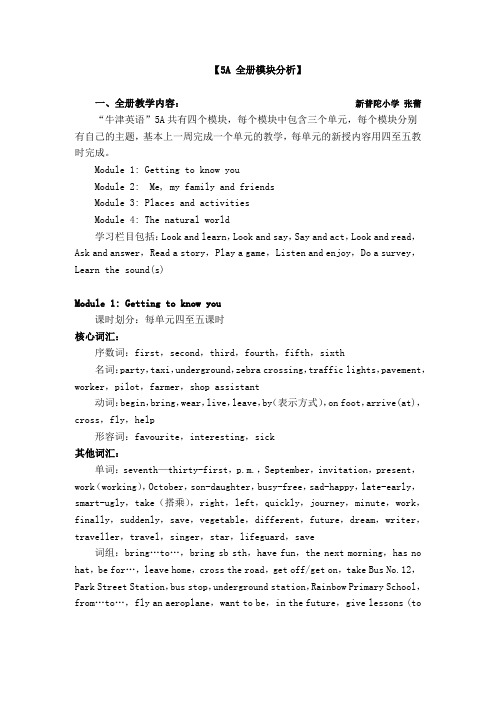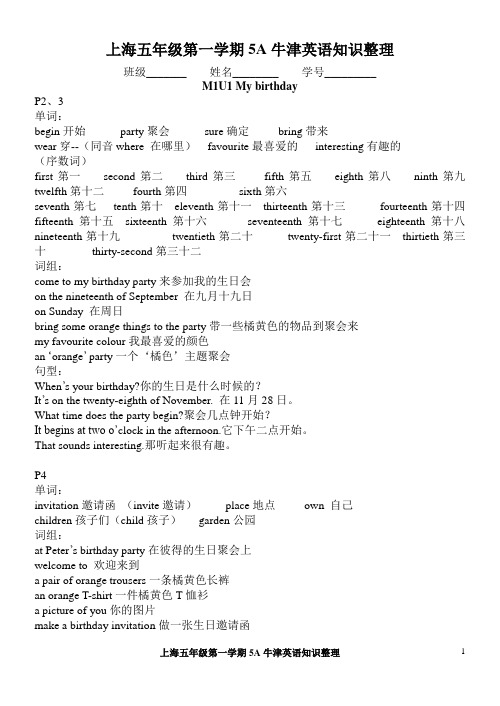牛津5A英语大纲
牛津英语五a教材课程

通过使用真实的英语对话、故事和听力材料,培养学生的听力理解能力。学生 将学习如何识别和理解不同的语音、语调和重音,以及如何从口头语言中提取 关键信息。
口语练习
通过角色扮演、小组讨论和即兴演讲等活动,鼓励学生积极参与口语表达。学 生将学习如何清晰、有逻辑地表达自己的观点,以及如何进行有效的沟通。
Course features
• Authentic content: Drawing from a variety of sources, including literature, newspapers, and websites, the course provides students with a broad range of authentic materials to enhance their language learning experience.
reading comprehension
阅读理解
通过阅读各种类型的文本,如故事、说明文和新闻报道等, 培养学生的阅读理解能力。学生将学习如何理解文本的主旨 、细节和作者的意图,以及如何推断和预测故事情节的发展 。
阅读技巧
学生将学习并掌握一些阅读技巧,如预测、推断、总结和批 判性思维等。这些技巧将帮助他们更有效地理解和分析文本 。
Writing Practice
写作练习
通过写日记、故事、说明文和电 子邮件等,培养学生的写作能力 。学生将学习如何组织思路、清 晰表达观点和提供证据支持。
写作反馈
教师将提供具体的反馈和指导, 帮助学生改进他们的写作技巧。 学生将学习如何接受和运用反馈 ,以提高他们的写作水平。
Interactive teaching
Course features
完整上海牛津英语5a知识点汇总文档

上海牛津英语5a知识点汇总Module1Unit1一,核心词汇第一第二第三第四第五第六派对,聚会开始带来穿着最喜欢的二,词组1.atPeter’sbirthdaypart y在Peter的生日聚会上 2.onthe19thofSeptember在9月19日onSunday在周日4.attwoo’clock在两点5.intheafternoon在下午 6.atnight在晚上7.sb.betired某人很累8.myfavouritecolor我最喜欢的颜色9.Thatsoundsinteresting.那听上去有趣10.Ican’twait!我等不及了!11.HappyBirthday!生日快乐12.Welcometomyparty.欢送来我的派对13.apairoforangetrousers一条橙色的裤子14.makeabirthdayinvitation制作一张生日请帖15.makeahat制作一顶帽子16.havesomefun过得快乐17.birthdaypresent生日礼物三,词汇解释,take,carry辨析bring是指把人或物从别处带到说话人所在的地方。
例如:Bringmesomewater,please.请给我取点水来。
carry及物动词,“搬运,运送〞,一般是指搬运较重的物品。
例如:carryaboxonone’sshoulder扛着箱子carryababyonone’sback背着孩子“携带,带〞例如:Almosteveryteachercarriesawatch.差不多每位教师都带着一只表。
Inevercarrymuchmoneyaboutme.我身边不带许多钱。
HowmanykilogramsofluggagecanIcarrywithme ?我随身可以带多少公斤行李?take是指把人或物从说话人的地方带到别处去。
例如:Takemyboxtomyroom.把我的箱子拿到房间去。
上海版牛津英语5A英文说课

Hello,my dear headmaster.I am sorry to say,this is my first time to present my lesson in English.I have told you two times that I can hand it in on time.But,I went back on my word.I feel sorry.Now,I am wondering how many presentations should I hand in.I think the number will be two.Now,I am trying to finish the first one.Today,I am going to talk about Unit One-Colours around us.Part One in book Five of Oxford English.The purpose of this part is Say and Act.Background['bækɡraʊnd] on the curriculum [kə'rɪkjələm]of Oxford English,this book can connect[kə'nekt]the life and act,emphasize['emfəsaɪz]the interest['ɪntrəst]and experience[ɪk'spɪəriəns]of the students.”Colour around us”this teaching mateirial[mə'tɪəriəl]pays more attention[ə'tenʃn]to the colours around us.This topic is related[rɪ'leɪtɪd]to our daily['deɪli]life.This is helpful for children to learn.In this lesson,there are no new words to learn.We’ll learn some new sentences and reading skills. As we all know, reading ability is very important for the Ss. so, we should develop it step by step. So,my purpose['pɜːpəs]is to improve students’abilities of reading and using language.['læŋɡwɪdʒ]I have always remembered what you said to us.That is there are steps to design a lesson.The first one:teaching aims[eɪm]That is read say and act.Then,I set up another 3 teaching aims for this lesson. One:knowledge aim. Let the Ss say the correct sentence in this lesson. Two: ability aim. That is to say let them retell the text in their own words. Three:emotional aim. To encourage[ɪn'kʌrɪdʒ]the students to commumicate with others and help them to find their lost things.They will increase their awareness[ə'weənəs]of contributions to people.The second one:analysis[ə'næləsɪs]the teaching matieral. Whose bird is this? Is thisyours? No,It isn’t mine.Mine is blue. Whose bird is this? Is this Mr Chen’s? No,it isn’t his.His is yellow.According to this,I think the key point is the possessive[pə'zesɪv]case of a noun.Let my students keep them in mind.However, there are two difficult points: they are how to use their own words to retell the text.The third one:design a way.That is situational teaching.Someone’s thing is lost.He want some help.The fourth one:feedback.Let them retell the text in their own words.Ok,now let me enjoy my lesson.Before dealing[dil] with my lesson, I'll do my best to carry out the following theories: Make the Ss the real masters['mɑːstə(r)] in class while the teacher myself act as a coach.Step 1 Revision1. Free talk: We live in a colourful world. What colour do you know? What colour do you like?What colour can you see?What colour are the tresss?What colour are the flowers?With the question, the minds of the Ss have entered the new lesson.2. Review: different colours. Show the different colours and let the students revise the colours.Step 2 Presentation1.To train their listening ability .Use the chant. Let the students listen and chant.By the way,review: my, mine, your, yours, his,his, her,hers,our,ours,their and theirs.2.To train their listening ability .Use the tape.Let them listen to the tape and answer the question "Is the blue bird Mrs Chen’s?3.To improve the students reading ability .Let them read the passage['pæsɪdʒ] as quickly as they can.Then,they will fill in the blank.As soon as they all finish, let them look at the questions on the screen[skrin] and ask them to write down the correct answerswith a whole sentence.4.Teacher say the e my left hand and my right hand.My hand can talk with each other.5.Call a student say the diologue with me.6.Let all the students say the diologue with me.7.Group work.Every two students can make a group to say the diologue.Step three:retell a story.2.Let the students practise the dialogue using their school things.A: Whose book is this? Is it yours?B: Yes, it’s mine. /No, it’s not mine. Mine is thick.That’s all.Thank you! Then let me come to the second one.。
牛津小学英语5AUnit1A

03
teaching method
Situational teaching
生动真实
通过创造真实或模拟的场景,让学生在实际情境中学习和运 用英语,增强语言实际运用能力。例如,模拟超市购物、餐 厅点餐等日常生活场景,让学生扮演不同角色进行对话练习 。
Game based teaching
趣味互动
利用游戏的形式进行英语教学,让学生在轻松愉快的氛围 中学习英语。游戏可以包括猜谜语、单词接龙、角色扮演 等,不仅能激发学生学习兴趣,还能加强师生、生生之间 的互动。
Course objectives
语言技能培养
文化意识提升
通过本单元的学习,学生将能够掌握基本 的听、说、读、写技能,并能够在实际生 活中运用这些技能进行交流。
学生将了解英语国家的文化背景,增强跨 文化交流的能力,并能够尊重和接纳不同 文化。
自主学习能力培养
合作学习能力培养
学生将学会如何独立学习英语,包括制定 学习计划、选择合适的学习资源和使用有 效的学习方法。
课堂参与度
观察学生在课堂上的参与程度, 是否能够积极回答问题,参与讨
论。
课堂纪律
评估学生的课堂纪律,是否能够遵 守课堂规则,不影响其他学生的学 习。
学习态度
评估学生的学习态度,是否认真听 讲,做好笔记,对学习内容感兴趣。
Homework evaluation
01
02
03
作业完成度
检查学生是否按时完成作 业,作业内容是否完整。
学生将学习基础的语法结构,如名词单复数形式、动词时态(现在时和过去时)以及简单的句子结构(主语+谓语,主语+谓 语+宾语)。通过练习和短文阅读,学生将能够理解和运用这些语法知识。
上海牛津英语5A全部教案

上海牛津英语5A全部教案Unit 1: Hello!Lesson 1: GreetingsLearning Objectives- Understand and use greetings in English- Respond to different greetings appropriately - Introduce themselves in EnglishKey Vocabulary- Hello-Hi- Good morning- Good afternoon- Good evening- How are you?- I'm fine, thank you.- What's your name?- My name is...- Nice to meet you.Teaching Procedure1. Warm-up (5 minutes)- Greet the students in English by saying "Good morning!" and asking "How are you?"- Encourage the students to respond with "Good morning!" and "I'm fine, thank you. How are you?"2. Presentation (10 minutes)- Introduce the new vocabulary by showing flashcards or pictures of greetings.- Model the pronunciation and ask the students to repeat after you.- Use gestures or actions to help convey the meanings of the words.- Practice saying different greetings with the students.3. Practice (15 minutes)- Divide the class into pairs or small groups.- Have the students take turns greeting each other and responding with appropriate expressions.- Walk around the classroom and provide assistance as needed.4. Production (15 minutes)- Have the students form a circle with their chairs.- Each student should introduce themselves by saying "Hello, my name is... Nice to meet you."- Encourage the students to ask each other "What's your name?" and respond with "My name is..." and "Nice to meet you."5. Consolidation (5 minutes)- Recap the new vocabulary and expressions learned in the lesson.- Have a class discussion about the importance of greetings in different cultures.6. Follow-up Activity (Optional)- Divide the class into two teams.- Play a game where each team takes turns greeting the other team in English.- Award points for correct greetings and responses.Unit 2: My DayLesson 1: Daily RoutineLearning Objectives- Understand and use vocabulary related to daily routines- Describe their own daily routines in English- Ask and answer questions about daily routinesKey Vocabulary- get up- have breakfast- go to school- have lunch- do homework- play games- have dinner- go to bedTeaching Procedure1. Warm-up (5 minutes)- Review the vocabulary from the previous lesson on greetings.- Play a quick game of Simon Says using the greetings and responses.- For example: Say "Simon says 'Good morning!'" and the students should respond with "Good morning!"2. Presentation (10 minutes)- Introduce the new vocabulary by showing pictures or flashcards of daily routines.- Model the pronunciation and ask the students to repeat after you.- Use gestures or actions to help convey the meanings of the words.- Practice saying different daily routines with the students.3. Practice (15 minutes)- Divide the class into pairs or small groups.- Have the students take turns asking and answering questions about their daily routines.- Encourage them to use the new vocabulary and expressions.4. Production (15 minutes)- Have the students work in pairs to create and performshort dialogues about their daily routines.- Each pair should write a simple dialogue using the new vocabulary and perform it in front of the class.- Provide feedback and encouragement to each group.5. Consolidation (5 minutes)- Recap the new vocabulary and expressions learned in the lesson.- Have a class discussion about the students' favorite parts of their daily routines.6. Follow-up Activity (Optional)- Have the students draw a picture or write a short paragraph describing their ideal daily routine.- They should use the new vocabulary and expressions learned in the lesson.。
5ANew Era 少儿英语牛津5A 核心词汇和重点句子

New Era少儿英语牛津5A 核心词汇和重点句子Module1 Getting to know youUnit1 Can I do this?★Words单词词性音标词义cross v. [krɔs] 穿越mean n. [mi:n] 意思or conj. [ɔ:] 或者road n. [rəud] 道路sign n. [sain] 标示station n. [`steiʃən] 车站underground n. [`ʌdəgraund] 地下铁路which pron. [witʃ] 哪一个,哪一样drink v. [driŋk]喝,饮one n. [wʌn] 一样,一件(物品)指前面提到的物品out adv. [aut] 外,在外rubbish n. [`rʌbiʃ] 垃圾smoke v. [sməuk] 吸烟wait v. [weit] 等候way n. [wei] 道路,方★Expressions词组词组意思say…sorry to 和···说抱歉the green man 绿色的人the red man 红色的人go out 出去make a noise 发出声音wait for 等候···traffic light 交通信号灯Unit2 This is what I want★Words单词词性音标词义BigMac n. [bigmæk]巨无霸汉堡包glue n. [glu:]胶水paper n. [peipə]纸scissors n. [`sizəz]剪刀vegetable n. [`vedʒtəbl]蔬菜Frenchfries n. [`frentʃfraiz]炸薯条McChicken n. [mæktʃikin]麦香鸡picnic n. [piknik]野餐tape n. [teip] 胶带want v. [wɔnt] 要,想要★Expressions词组词组意思have a picnic 进行野餐go for a picnic 去野餐a pair of scissors 一副剪刀want to do sth 想要做某事made from 由…制造shopping list 购物单Unit3 This is what I need ★Words单词词性音标词义bake v. [b ei k] 买cheap adj. [tʃi:p] 便宜的for prep. [fɔ:] 为······salt n. [sɔ:l t] 盐wear v. [w eə] 穿着buy v. [b ai] 买dear adj. [d iə] 昂贵的need v. [n i:d] 需要uniform n. [`j u:n i fɔ:m] 制服★Expressions词组词组意思bake a cake 烤蛋糕a letter for you 给你写封信a present for you 给你一个礼物things for school 上学用的东西smell good 闻起来很好let’s 让我们······Moudle2 Me my family and friendsUnit1 Me★Words单词词性音标词义at prep. [æt] 在(几点钟)home n. [həum] 家mice n. [mais] 老鼠(复数)park n. [pa:k] 公园group n. [gru:p] 小组morning n. [`mɔ:niŋ] 早晨,上网night n. [nait] 夜outside n. [autsaid] 在外面way n. [wei] 方法★Expressions词组词组意思get up 起床go home 回家go to bed 上床睡觉go to school 去学校watch TV 看电视do one’s homework 做作业wash one’s face 洗脸clean/brush one’s teeth 刷牙at night 在夜间Unit2 Are you happy★Words单词词性音标词义be v. [bi:] (am,is,are的原行)carrot n. [`kærət] 胡萝卜doesn’t v. [`dʌznt] 不······know v. [nəu] 知道,了解on prep. [ɔn] 在…上sausage n. [`sɔsidʒ] 肉肠show v. [ʃəu] 给…看tea n. [ti:] 茶cabbage n. [`kæbidʒ] 卷心菜dessert n. [dizə:t] 甜点drink n. [driŋk] 饮料nod v. [nɔd] 点头potato n. [`pəteitəu] 土豆shout v. [ʃaut] 大声叫唤sick adj. [sik] 有病的Unit3 A birthday party ★Words单词词性音标词义colour n. [kʌlə] 颜色eleventh adj. [i`levnθ] 第十一first n. [fə:st] 第一invitation n. [ivi`teiʃən] 请柬o f…prep. [ɔf] 的picture n. [`piktʃə] 图片seventh adj. [`sevnθ] 第七tenth adj. [tenθ] 第十thirtieth adj. [θə:tiəθ] 第三十twentieth adj. [`twentiəθ] 第二十when adv. [wen] 什么时候eighth adj. [eitθ] 第八fifth adj. [fifθ] 第五fourth adj. [fɔ:θ] 第四ninth adj. [naiθ] 第九party n. [pa:ti] 聚会second adj. [`sekənd] 第二sixth adj. [siksθ] 第六third adj. [θə:d] 第三twelfth adj. [twlfθ] 第十二twenty-first adj. [`twentifə:st] 第二十一★Expressions词组词组意思Children’s day 儿童节Teacher’s day 教师节Christmas 圣诞节New Year’s Day 元旦Women’s Day 妇女节Module3 Places and activitiesUnit1 A day at school★Words单词词性音标词义floor n. [flɔ:] 地板,(楼房的)层toilet n. [`tɔilit] 厕所cupboard n. [kʌbəd] 橱柜English n. [`iŋgliʃ] 英语science n. [saiəns] 科目break v. [breik] 休息tram n. [træm] 电车hall n. [hɔ:l] 大厅fan n. [fæn] 扇子,电扇timetable n. [`taimteibl] 时刻表Chinese n. [tʃai`ni:z] 中文maths n. [mæθ] 数学lesson n. [`lesn] 课taxi n. [`teksi] 出租车walk v. [wɔ:k] 步行,走★Expressions词组词组意思Physical Education 体育Art and craft 美工have a break 休息have a lesson 上课have lessonsat break 在休息时Unit2 Let’s go shopping★Words单词词性音标词义hundred n. [`hʌndrəd] 百coin n. [kɔin] 硬币fifty n. [fifti] 五十note n. [nəut] 纸币money n. [mʌni] 钱skateboard n. [`skeitbɔ:d] 滑板★Expressions词组词组意思pencil case 铅笔盒three one-yuan coins 三个一元的硬币excuse me 对不起go shopping 购物a ten-yuan note 一张十元的纸币an old umbrella 一把旧雨伞Unit3 Follow the signs★Words单词词性音标词义pool n. [pu:l] 池dangerous adj. [`deindʒərəs] 危险的ride adj. [raid] 骑bring adj. [briŋ] 带来our adj. [`auə] 我们的country n. [`kʌntri] 国家,乡村sign n. [sain] 标记rule n. [ru:l] 规则exit n. [`eksit] 出口quarter n. [`kwɔ:tə] 四分之一,一刻north n. [nɔ:θ] 北south n. [sauθ] 南west n. [west] 西east n. [i:`st] 东why adv. [wai] 为什么because conj. [bi`kɔz] 因为★Expressions词组词组意思swimming pool 游泳池词组词组意思jump into 跳进…play ball games 进行球类活动a day out 一日游North Country Park 北国公园Module4 The natural worldUnit1 Wild animals★Words单词词性音标词义natural adj. [`nætʃrəl] 自然的climb v. [klaim] 网上爬cage n. [keidʒ] 洞穴rope n. [rəup] 绳子feed v. [fi:d] 喂食fruit n. [fru:t] 水果dive v. [daiv] 潜水,跳水poem n. [`pəuim] 诗歌busy adj. [bizi] 忙碌的choose v. [tʃu:z] 选择bar n. [ba:] 木条单词词性音标词义wild adj. [waild] 野生的top n. [tɔp] 顶部swing v. [swiŋ] 摇摆zoo-keeper n. [zu:ki:pə] 动物园管理员jungle n. [`dʒʌŋgl] 丛林leaf n. [li:f] 叶子crocodile n. [`krɔkədail] 鳄鱼if conj. [if] 如果peel v. [pi:l] 剥皮through prep. [θru:] 通过★Expressions词组词组意思at the top of 在…顶部a top student 尖子生a sad face 一张伤心的面孔through the bars 透过栏杆Unit2 Butterflies★Words单词词性音标词义butterfly n. [`bʌtəflai] 蝴蝶cocoon n. [kə`ku:n] 茧子caterpillar n. [`kætəpilə] 毛毛虫wet adj. [wet] 湿的make v. [meik] 制作feeler n. [`f i: l ə] 触角use v. [j u:z] 使用ugly adj. [`ʌg l i] 丑陋的spell v. [s p e l] 拼读insect n. [`i n s e k t] 昆虫become v. [b i`kʌm] 成为grow v. [g rəu] 成长dry adj. [drai] 干的body n. [bɔd i] 身体wing n. [w iŋ] 翅膀★Expressions词组词组意思in English 用英语词组词组意思lay eggs 产卵come out 出来cut out 剪出make a little house 结茧Unit3 Parks and places in China ★Words单词词性音标词义point v. [pɔi n t] 指出island n. [`ai lən d] 岛屿aquarium n. [ə `k w eər iəm] 海族馆theatre n. [`θiətə] 剧场dolphin n. [`dɔf i n] 海豚brave adj. [b r ei v] 勇敢的afraid adj. [əfreid] 害怕的square n. [s k w eə] 广场restaurant n. [`r e s t rɔn t] 饭店shark n. [ʃa:k] 鲨鱼seal n. [s i:l] 海狮diver n. [`d ai və] 跳水员,潜水员单词词性音标词义high adj. [h ai] 高的catch v. [kætʃ] 抓住★Expressions词组词组意思Ocean Park 海洋公园West Lake 西湖Yu Garden 豫园Li River 漓江Hong Kong 香港Ocean Theatre 海洋剧院catch a bus 赶上车catch a thief 抓小偷cats catch mice 猫捉老鼠fish aquarium 水族馆a map of china 一张中国地图a map of world 一张世界地图Let’s go to…让我们去…。
oxford 沪教5A全册模块分析

【5A 全册模块分析】一、全册教学内容:新普陀小学张蕾“牛津英语”5A共有四个模块,每个模块中包含三个单元,每个模块分别有自己的主题,基本上一周完成一个单元的教学,每单元的新授内容用四至五教时完成。
Module 1: Getting to know youModule 2: Me, my family and friendsModule 3: Places and activitiesModule 4: The natural world学习栏目包括:Look and learn,Look and say,Say and act,Look and read,Ask and answer,Read a story,Play a game,Listen and enjoy,Do a survey,Learn the sound(s)Module 1: Getting to know you课时划分:每单元四至五课时核心词汇:序数词:first,second,third,fourth,fifth,sixth名词:party,taxi,underground,zebra crossing,traffic lights,pavement,worker,pilot,farmer,shop assistant动词:begin,bring,wear,live,leave,by(表示方式),on foot,arrive(at),cross,fly,help形容词:favourite,interesting,sick其他词汇:单词:seventh—thirty-first,p.m.,September,invitation,present,work(working),October,son-daughter,busy-free,sad-happy,late-early,smart-ugly,take(搭乘),right,left,quickly,journey,minute,work,finally,suddenly,save,vegetable,different,future,dream,writer,traveller,travel,singer,star,lifeguard,save词组:bring…to…,bring sbsth,have fun,the next morning,has no hat,be for…,leave home,cross the road,get off/get on,take Bus No.12,Park Street Station,bus stop,underground station,Rainbow Primary School,from…to…,fly an aeroplane,want to be,in the future,give lessons (tosb),sell sth to sb,(be) from…,travel around the world,(be) afraid of,(be)(not) good at…语法:特殊疑问句:When’s your birthday? It’s on ….(date)What do you have?How do you come to school? I come to school…When do you…?What do you want to be? I want to be a/an…祈使句:Wait for the green light.一般现在时:…(always/never) do/does….Peter wants to be a pilot.日期表达法地点表达法日常用语:That sounds interesting.I can’t wait.That’s correct.What about you?语音:长元音 /i:/ (-e, -e_e-, -ee-, -ea-)短元音 /I/ (-i-, -y-)/e/ (-e-, -a-, -ea-)// (-a-)辅音 /p/ (-p-)/b/ (-b-)/t/ (-t-)/d/ (-d-)/k/ (-k-, -c-, -ck)/g/ (-g-)Module 2: Me, my family and friends课时划分:每单元四至五课时核心词汇:名词:class,north,south,west,east,match(比赛),study(书房),weekend,(the) internet动词:talk副词:once,twice,together形容词:(the) same,different,(north,south,west,east)代词:both,all词组:write an e-mail,go shopping,play chess,each other,a lot of 其他词汇:单词:grandchild,strange(奇怪的&粗壮的),hug,hunter,change,class,face(面向),fifteenth,half-time,win,difficult,hero,team,miss,mover,rat-tat,share,sunshine,take(需要……时间),through, wild goose,enough词组:go (doing),at weekends,three times,do the housework,knock at the door,go on an outing,Double Ninth cake,floor plan,have a cold,Little Red Riding Hood,all/many kinds of,be members of…,all of(宾格),move home,share…with…,(be) happy with,tell…about…,(be) far from…语法:特殊疑问句:How often…?What do you do with them?Why do you like it? Because….Which room do you like?How’s your new home,Peter?Where are Peter and Paul?频率副词one,twice,always,often,usually的用法代词both,all的用法To like句型形容词same,different的用法There be句型It’s a …for….结构日常用语:Who’s here?Are you all right,…?I’m OK.Let’s wait and see!Congratulation!语音:长元音 /a:/ (-a-, -ar-)/u:/ (-u-,-oo-)短元音 // (-u-, -o-)// (-u-,-oo-)清辅音 /f/ (-f,f-)// (-th,th-)浊辅音 /v/ (-v-)// (-th,th-)Module 3: Places and activities课时划分:每单元四至五课时核心词汇:名词:hotel,bank,hospital,bakery,museum,cinema,button,zip,packet,fever,toothache,cough,cold,medicine动词:turn,need介词:along形容词:well词组:put on,try on其他词汇:单词:crocodile,crossing,lane,left,right,shark,dolphin,meet,ocean,dark,naughty,laugh,nod,take(选择,购买),price,emperor,magic,silent,polka dot,slipper,raincoat,sneaker,boots,best,better,cave,dentist,either,hide,hurt,secret,soft drink,toothless,shall,world,king,really词组:get to,look for,turn (left/right),on one’s left/right,a visit to…,have nothing on,cry out,hundreds of,tell the truth,give sbsth,have a rest,pull…out,have(生病) a…,take medicine语法:特殊疑问句:How do I get to…,please?Which dress do you like?Why not try on both?What should I do? You should….祈使句:Walk along Green Road.Can句型Want to do句型Like句型连词or的用法不定代词one的用法To have句型日常用语:Right?Good idea!What do you think,…?What’s wrong with you?How do you feel?You will be better soon.Oh dear!语音:长元音 // (-or-, -al-,-au-,-oor)// (-er-,-ir-,-ur-,-or-)短元音 // (o-,-o-,-a-)// (-er,a-,-a-,a-)清辅音 /s/ (-s,s-,c-,-c-)/ts/ (-ts)浊辅音 /z/ (z-,-z-,-s-,-s)/dz/ (-ds)Module 4: The natural world课时划分:每单元四至五课时核心词汇:名词:tea,campfire,match(火柴),safety动词:boil,pour,drink,blow,smoke,start副词:first,next,then,finally,gently,strongly,slowly,quickly,happily形容词:careful其他词汇:单词:the Three Gorges,the Yangtze River,the Huangpu River, into,more,part,raindrop,report,teapot,toilet,heavily,softly,heavy,hope,wind-bell,wood,weatherman,fold,the Stone Age,fight,heat,light,hate,lift,dangerous,smoky,crawl,cover,bravely,burn,country,drop,helicopter,luckily,must,raw,sign,throw词组:fall from,rise up (to),make tea,pour…into,give a report,(be) part of…,fly over,I’m afraid…,(be) made of…,cut…out,cut along…,pin…to…,die down,tell…about…,talk about…,not…at all,throw…away语法:特殊疑问句:What are you doing,Grandma?What’s that?连续性副词first,next,then,finally的用法以-ly结尾的副词用法频率副词twice的用法现在进行时:…is/am/are doing….一般现在时: …do/does….情态动词can,must的用法命令式句型:Don’t smoke!日常用语:Would you like some?What’s next?It tastes great!语音:清辅音 // (ch-,-ch)// (sh-,-sh)/tr/ (tr-)浊辅音 // (g-,-g-,j-)// (-s-)/dr/ (dr-)单元教学目标:本册书由内容相对独立但具有内在联系的四个模块(Module)组成,每个模块中包含三个单元(Unit),每个单元围绕一个主题展开,由若干学习栏目构成,要依据栏目功能的不同从各个角度呈现语言材料,创设生活化、时代性、文化性等不同情境,将语言材料和语言技能有机结合,并注重各模块在横向学习内容上的循序渐进,在纵向语言知识和技能上滚动和复现,以达到学生学习语言知识、获得语言技能的目的,从而为真实语言交际打下夯实的基础。
上海五年级第一学期5A牛津英语知识整理

上海五年级第一学期5A牛津英语知识整理班级_______ 姓名________ 学号_________M1U1 My birthdayP2、3单词:begin开始party聚会sure确定bring带来wear穿--(同音where 在哪里)favourite最喜爱的interesting有趣的(序数词)first第一second第二third第三fifth第五eighth第八ninth第九twelfth第十二fourth第四sixth第六seventh第七tenth第十eleventh第十一thirteenth第十三fourteenth第十四fifteenth第十五sixteenth第十六seventeenth第十七eighteenth 第十八nineteenth第十九twentieth第二十twenty-first第二十一thirtieth第三十thirty-second第三十二词组:come to my birthday party来参加我的生日会on the nineteenth of September 在九月十九日on Sunday 在周日bring some orange things to the party带一些橘黄色的物品到聚会来my favourite colour我最喜爱的颜色an ‘orange’ party一个‘橘色’主题聚会句型:When’s your birthday?你的生日是什么时候的?It’s on the twenty-eighth of November. 在11月28日。
What time does the party begin?聚会几点钟开始?It begins at two o’clock in the afternoon.它下午二点开始。
That sounds interesting.那听起来很有趣。
P4单词:invitation邀请函(invite邀请)place地点own 自己children孩子们(child孩子)garden公园词组:at Peter’s birthday party在彼得的生日聚会上welcome to 欢迎来到a pair of orange trousers一条橘黄色长裤an orange T-shirt一件橘黄色T恤衫a picture of you你的图片make a birthday invitation做一张生日邀请函句型:What orange things do you have?你有什么橘色物品?I have an orange hat.我有一顶橘色帽子。
